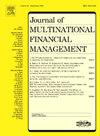不确定性冲击对中国贸易开放的时间动态影响:tpv - var估计
IF 4
3区 经济学
Q2 BUSINESS, FINANCE
Journal of Multinational Financial Management
Pub Date : 2025-06-06
DOI:10.1016/j.mulfin.2025.100916
引用次数: 0
摘要
本研究考察了1997 - 2023年多个不确定性因素对中国贸易开放的影响。本文采用时变参数向量自回归(TVP-VAR)模型,分析了地缘政治风险、经济政策不确定性、贸易政策不确定性和气候政策不确定性在不同时间尺度上对中国进出口比的影响。该分析结合了全球和中国特定的不确定性指数,以捕捉国内和国际维度。我们的研究结果表明,不确定性冲击在冲击后的第一季度表现出最强的影响,影响逐渐减弱,但在较长时间内仍然显著。时变脉冲响应函数揭示了不同经济时期的差异效应,包括2008年金融危机和随后的欧元区债务危机等重大经济事件后的显著反应。我们发现,气候政策的发展与可观察到的贸易模式变化相吻合,而贸易模式的变化可能与环境技术部门的变化有关。这些发现对于理解在日益复杂的全球经济环境中贸易流动如何应对各种冲击具有重要意义。本文章由计算机程序翻译,如有差异,请以英文原文为准。
Temporal dynamics of uncertainty shocks on China's trade openness: A TVP-VAR estimation
This study examines the impact of multiple uncertainty factors on China's trade openness from 1997 to 2023. Employing a time-varying parameter vector autoregression (TVP-VAR) model, we analyze how geopolitical risks, economic policy uncertainties, trade policy uncertainties, and climate policy uncertainties affect China's export-to-import ratio over different time horizons. The analysis incorporates both global and China-specific uncertainty indices to capture domestic and international dimensions. Our results indicate that uncertainty shocks exhibit their strongest effects in the first quarter following the shock, with impacts diminishing but remaining significant over longer horizons. The time-varying impulse response functions reveal differential effects across various economic periods, including notable responses following major economic events such as the 2008 financial crisis and subsequent Eurozone debt crisis. We find that climate policy developments coincide with observable shifts in trade patterns, which could be associated with changes in environmental technology sectors. These findings have implications for understanding how trade flows respond to various shocks in an increasingly complex global economic environment.
求助全文
通过发布文献求助,成功后即可免费获取论文全文。
去求助
来源期刊

Journal of Multinational Financial Management
BUSINESS, FINANCE-
CiteScore
7.30
自引率
4.80%
发文量
25
审稿时长
30 days
期刊介绍:
International trade, financing and investments have grown at an extremely rapid pace in recent years, and the operations of corporations have become increasingly multinationalized. Corporate executives buying and selling goods and services, and making financing and investment decisions across national boundaries, have developed policies and procedures for managing cash flows denominated in foreign currencies. These policies and procedures, and the related managerial actions of executives, change as new relevant information becomes available. The purpose of the Journal of Multinational Financial Management is to publish rigorous, original articles dealing with the management of the multinational enterprise. Theoretical, conceptual, and empirical papers providing meaningful insights into the subject areas will be considered. The following topic areas, although not exhaustive, are representative of the coverage in this Journal. • Foreign exchange risk management • International capital budgeting • Forecasting exchange rates • Foreign direct investment • Hedging strategies • Cost of capital • Managing transaction exposure • Political risk assessment • International working capital management • International financial planning • International tax management • International diversification • Transfer pricing strategies • International liability management • International mergers.
 求助内容:
求助内容: 应助结果提醒方式:
应助结果提醒方式:


